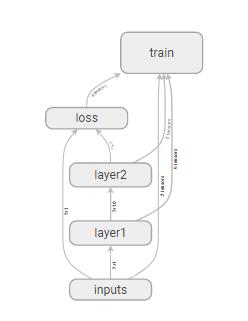TensorFlow-tensorboard結果視覺化
阿新 • • 發佈:2019-01-11
TensorFlow-tensorboard結果視覺化
硬體:NVIDIA-GTX1080
軟體:Windows7、python3.6.5、tensorflow-gpu-1.4.0
一、基礎知識
tensorboard為TensorFlow網路視覺化的介面
tf.name_scope for network architecture
tf.summary(histogram, scalar) for variable
二、程式碼展示
import tensorflow as tf import numpy as np #name_scope for network architecture #summary for variable def add_layer(inputs, in_size, out_size, n_layer, activation_function=None): layer_name = 'layer%s' % n_layer with tf.name_scope(layer_name): with tf.name_scope('weights'): Weights = tf.Variable(tf.random_normal([in_size, out_size]), name='W') # wanna see weights by histogram tf.summary.histogram(layer_name + '/weights', Weights) with tf.name_scope('biases'): biases = tf.Variable(tf.zeros([1, out_size]) + 0.1, name='b') # wanna see weights by histogram tf.summary.histogram(layer_name + '/biases', biases) with tf.name_scope('Wx_plus_b'): Wx_plus_b = tf.add(tf.matmul(inputs, Weights), biases) if activation_function is None: outputs = Wx_plus_b else: outputs = activation_function(Wx_plus_b, ) # wanna see outputs by histogram tf.summary.histogram(layer_name + '/outputs', outputs) return outputs x_data = np.linspace(-1, 1, 300)[:, np.newaxis] noise = np.random.normal(0, 0.05, x_data.shape) y_data = np.square(x_data) - 0.5 + noise with tf.name_scope('inputs'): xs = tf.placeholder(tf.float32, [None, 1], name='x_input') ys = tf.placeholder(tf.float32, [None, 1], name='y_input') l1 = add_layer(xs, 1, 10, n_layer=1, activation_function=tf.nn.relu) prediction = add_layer(l1, 10, 1, n_layer=2, activation_function=None) with tf.name_scope('loss'): loss = tf.reduce_mean(tf.reduce_sum(tf.square(ys - prediction), reduction_indices=[1])) # wanna see loss by scalar(coordinate) tf.summary.scalar('loss', loss) with tf.name_scope('train'): train_step = tf.train.GradientDescentOptimizer(0.1).minimize(loss) sess = tf.Session() # merge all summary like variables initializer merged = tf.summary.merge_all() #apply summary, ready to save, to "logs" directory writer = tf.summary.FileWriter("logs/", sess.graph) init = tf.global_variables_initializer() sess.run(init) for step in range(1000): sess.run(train_step, feed_dict={xs: x_data, ys: y_data}) if step % 50 == 0: #show merge like show loss result = sess.run(merged, feed_dict={xs: x_data, ys: y_data}) #save to summary writer.add_summary(result, step) sess.close()
三、執行tensorboard
3.1 執行上例程式,“logs”資料夾下得到儲存檔案
3.2 開啟cmd,進入logs資料夾同級目錄
3.3 執行 tensorboard --logdir=logs (注意不要用"logs")
3.4 開啟Google Chrome(其他瀏覽器不保證),輸入3.3執行結束的網址
四、結果視覺化



任何問題請加唯一QQ2258205918(名稱samylee)!
